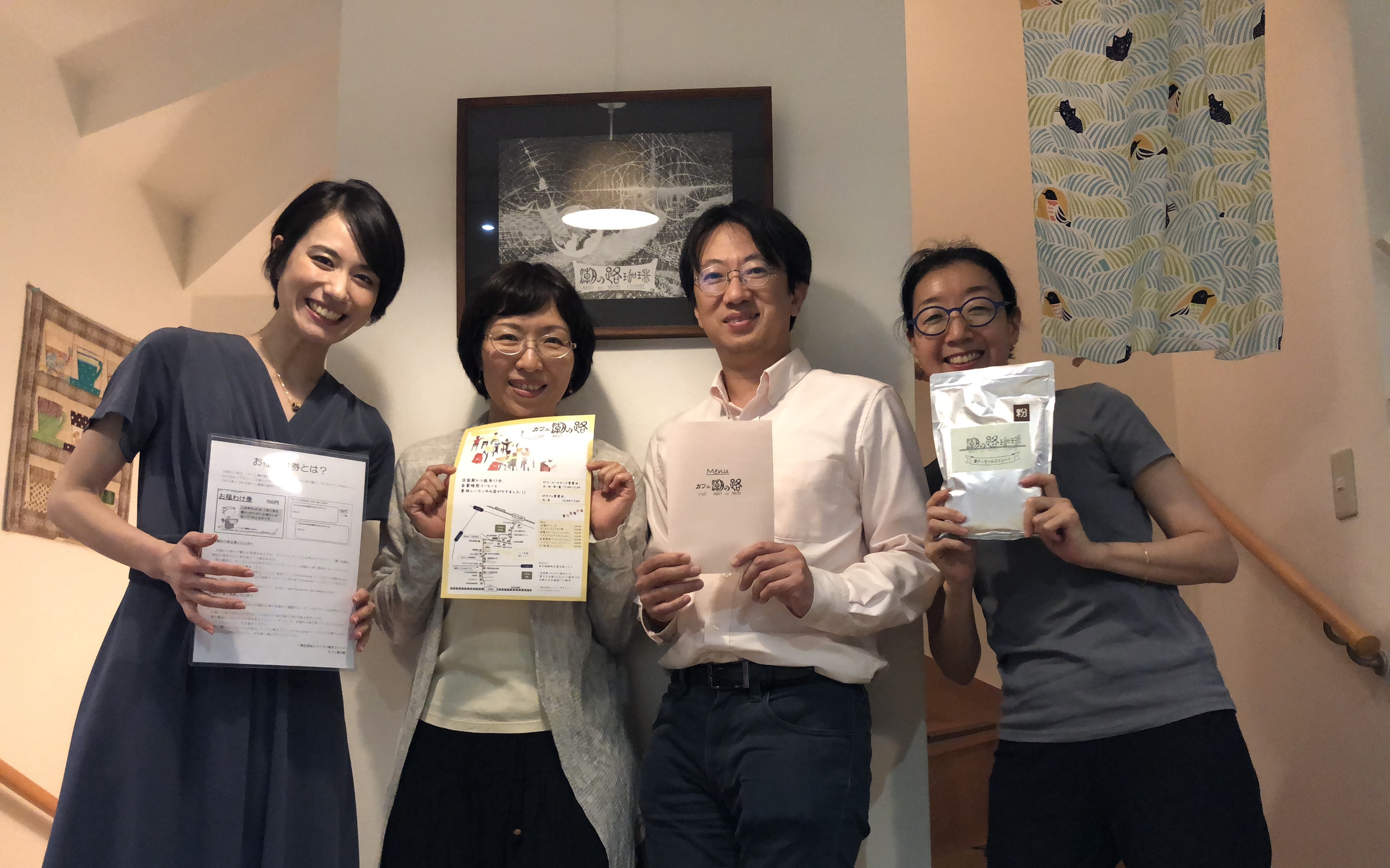Tsukuroi Tokyo Fund
“Repairing the safety net with the support of citizens” is the mission of Tsukuroi Tokyo Fund, a 2017 FIT For Charity Run beneficiary that provides support with various services to the needy such as housing, jobs, and shelter. It also runs a cafeteria for children.
Members of FIT For Charity Organising Committee met with Tsukuroi Tokyo Fund’s Director, Mr. Tsuyoshi Inaba, and Coordinator of their café “Shio no Michi”, Ms. Mihoko Kobayashi, to hear more from them.

From left, Ms. Haruka Matsumoto (FIT Co-chair), Ms. Mihoko Kobayashi (Coordinator of café “Shio no Michi”), Mr. Tsuyoshi Inaba (Tsukuroi Tokyo Fund’s Director), and Ms.Michiko Shima (FIT Communications team)
FIT: Please tell us about what made you start Tsukuroi Tokyo Fund.
Inaba: I first was motivated when I started volunteering to support homeless people when I was a graduate student. Due to the collapse of the Bubble Economy in the 1990s, there was a sudden increase in people living on the streets. Volunteers who supported them such as myself at the time are called the “first generation supporters of the homeless.”
It is said that the number of homeless people reached a peak in 2003 at approximately 25,000 people nationwide. Currently, the number is estimated at 6,000 and in urban areas about 1/4 of the peak number. We know today that many of the homeless people who cannot escape from their situations also have some degree of mental illness or disabilities. People with mental disabilities and/or homeless people are technically able to find shelter by applying for welfare protection at a local ward office.
However, most of the shelter facilities offered by ward offices are shared dormitories. In some cases there are as many as 20 people sharing the same room. In such a small and cramped environment, it is common to see those with mental disabilities to end up back on the streets after having failed to adjust to the dormitory lifestyle, or to avoid bullying from others. While I was thinking about how I could be of help, someone introduced to me to 7 vacant rooms in Numabukuro (editor’s note: located in Nakano Ward). Through crowd-funding, I was able to establish private room shelters equipped with necessary items for daily living. Taking this opportunity in 2014, I set up Tsukuroi House.
FIT: How did Ms. Kobayashi become the coordinator for “Shio no Michi”?
Kobayashi: I was living in Shanghai in 2008 when I saw the news about the tent city for the jobless and homeless. Until then, I believed that poverty was only an issue in places such as Africa and Cambodia, so it left a strong impression with me.
After seeing the news, every time I walked around in Japan, I started to notice all the people living on the streets something I hadn’t noticed before. When I came back to Japan, I joined NPO Big Issue Japan Foundation as an intern and studied the welfare benefits system at the same time while working for other organisations that supported those living in poverty.
FIT: What kind of activities does Tsukuroi Tokyo Fund engage in?
Inaba: Our 3 main areas of focus are housing, employment and a “place of belonging”. With regards to housing, first starting from Nakano Ward, we expanded to 22 different rooms for private room shelters in Shinjuku, Toshima, and Sumida Ward.
The housing project we started as Tsukuroi House received quite a bit of media attention and combined with the issue of many abandoned vacant homes, we received more and more requests from landlords asking us to use their rooms.
In addition, about twice a month, we walk at night around the parks in Tokyo talking to homeless people. Some of the people we talk to inquire about getting off the street and moving into a private room shelter. As a result, about 40 to 50 people used our facilities in 2017 and were able to start living on their own afterwards.
We started our second areas of focus, providing employment and a place of belonging in April 2017 by setting up our Café Shio no Michi (translation: Road of the Tide). We opened the café as a gathering place and to provide work to homeless people who started to become self-reliant.
Some of those who manage to become self-reliant have mental illnesses and/or substance addiction problems, often face difficulties in managing their finances, need to be off work regularly due to medical treatment, have communication challenges such managing neighbour relations, and as a result often become isolated. By cooperating with visiting nurse stations and psychiatric clinics, our Café Shio no Michi provides support for both jobs and a place of belonging.
Currently, the café is run by volunteers and six former homeless people. We roast coffee on the first floor, and sell it at the store and on the internet. Freshly brewed coffee is also sold from Tuesday to Friday from 12pm to 3pm. On the second floor is where we provide meals between 11am and 5pm from Tuesday to Friday. We keep the price to one coin (500 yen) so as to provide an affordable place that welcomes many people.
FIT: What points did you particularly think out when setting up the café?
Kobayashi: Besides providing support with jobs and a place of belonging, we also wanted to encourage interaction with local residents. I wanted people from a wider generation range to know about homeless people. Instead of having presentations or lectures, I wanted to create a natural environment where people would sit down for a coffee and the person at the next table just happens to be a former homeless person. Therefore I made the shop front a little fancy and obtained a restaurant business license. Fortunately there are not many restaurants in this neighbourhood, so many shop owners, company employees and homeless people come here for lunch.
Furthermore, we offer Ofukuwake (translation: sharing fortune) tickets for 700 and 200 yen. Copying the “pay it forward” concept seen in other countries, patrons can choose to pay upfront for the next customer. We wanted this to go beyond a single interaction and have people to think more about the homeless, and therefore provide on the back of the ticket a space for the donor and beneficiary to write a message, which we then share on SNS. By having the beneficiary write their name and a message in response, they become a “real” person to the donor. I hope this program will enlighten and change the view point of those who chose to donate. So far the tickets have been quite popular: We have sold about 900 of 700 yen tickets and more than 200 of 200 yen tickets.
FIT: Were there any difficulties in starting the café?
Kobayashi: The biggest challenge was trying to cook 30 to 40 servings of food. I try to find the best ingredients by riding my bike even when it rains. Preparing and cooking is still a tough part of the job, but I am pleased whenever someone finishes the plate clean and shiny.
FIT: When do you feel most rewarded, or energised?
Kobayashi: I am delighted whenever someone has a first-time experience related to food. Many of our customers have not had many opportunities to eat a variety of food. Some have told me that they ate marmalade or tasted coriander for the first time at our café. I would like them to gain more life experience through food.
FIT: Please tell us about your future goals.
Inaba: I would like to increase the capacity of our work with the funds from FIT. For example, I would like to go beyond serving coffee and lunch by making and selling bento boxes for delivery. I would also like to create employment opportunities within the homeless community. Since there are many elderly and people who live alone in this area, we could thereby contribute to their lives. The homeless people could go shopping for them, replace light bulbs, and by doing so we can create jobs for those without work, have them recognised by the local community, and start the cycle of positive feedback. I still need time to prepare a variety of things, but I really hope to realise these goals.
** Tsukuroi Tokyo Fund opens their café twice a week, sells coffee, and conducts twice a month nightly walk-arounds. If you would like to volunteer at Tsukuroi Tokyo Fund, please contact them directly.
http://tsukuroi.tokyo/information/

